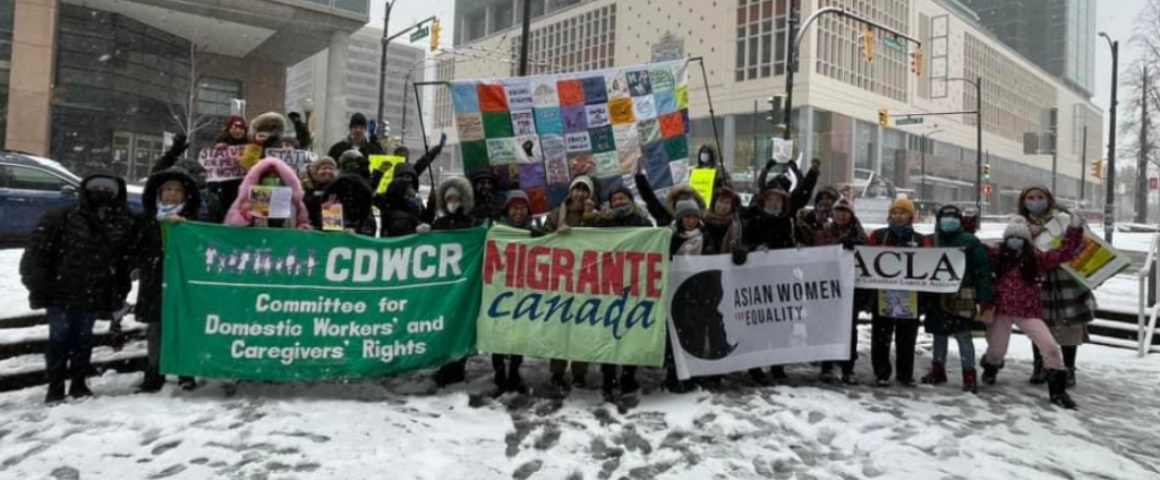Two federal pilot programs promised migrant care workers decent working conditions and a path to permanent residency. But those programs have failed to deliver, with workers instead facing widespread racism and employment abuse, a new report shows.
Released October 23, A Decade of Migrant Care Worker Programs: Addressing racism and precarity in Canada highlights the voices and experiences of these workers, predominantly racialized women. It makes several key recommendations for providing a path to permanent residency and ending exploitation by employers.
The report is the work of the Migrant Care Worker Precarity Project. Convened by the Vancouver Committee for Domestic Workers and Caregivers Rights (CDWCR), the project brings together researchers from Simon Fraser University, Thompson Rivers University and the University of British Columbia. Participating organizations include the Canadian Centre for Policy Alternatives (BC Office), the BC Federation of Labour and the Understanding Precarity in BC Partnership supported by the Social Sciences and Humanities Research Council of Canada.
Migrant care workers typically provide essential caregiving services, mostly in private homes, for children, the elderly and people with special needs. The report examines the experience of workers who came to Canada through pilot programs launched in 2014 and 2019 under the Temporary Foreign Worker Program and the International Mobility Program.
The report reveals a range of abuses by employers, who withheld wages and tax refunds, forced employees to work unpaid hours, fired them for asking for time off for personal matters, subjected them to verbal abuse and provided poor and unsafe living conditions.
Co-founder of the CDWCR and project convenor Cenen Bagon said it’s time for the government to implement changes. “Migrant domestic workers, care workers, and their long-time advocates have fought hard since 1979 for recognition in Canada, and rightfully so, because if we are good enough to work here, we’re good enough to stay and have permanent resident status upon arrival. Now it’s time for the federal government to follow through, replacing short-term pilot programs with a permanent care worker immigration program.”
Migrant care workers also face enormous barriers to permanent residency. The report documents backlogs and years-long waits, complex and changing requirements and caps on applications. Workers’ temporary status compounds their vulnerability to exploitation.
Alicia Massie, PhD candidate at Simon Fraser University, spoke of these barriers. “When the federal Home Care Provider and Home Support Worker pilot programs were launched in 2019, they were supposed to provide a direct pathway to permanent residency. But five years later, they have failed to deliver on that promise. Only 5,700 care workers and their family members became permanent residents in the programs’ five-year existence. These programs were supposed to provide a path to permanent residency for 5,500 workers per year.”
The report makes several recommendations to the federal government, including permanent residency upon arrival for migrant care workers (including those who’ve fallen out of status), action to clear the backlog and a fairer application process for migrant care worker programs. The report also calls on provincial governments to take robust action to ensure these workers receive full employment protection.
“Underpaying, exploiting and abusing workers is never right, and migrant care workers are especially vulnerable,” said BC Federation of Labour President Sussanne Skidmore. “This report underlines our call for much stronger employment standards enforcement and education. It reinforces the need for permanent residency on arrival for these workers. And it’s one more reason BC should be looking at reforms to the Labour Relations Code, so that migrant care workers can exercise their Charter-protected right to organize and bargain collectively.”
[Photo: Migrant Rights Network]
Support working-class media!
If you found this article useful, please consider donating to People’s Voice or purchasing a subscription so that you get every issue of Canada’s leading socialist publication delivered to your door or inbox!
For over 100 years, we have been 100% reader-supported, with no corporate or government funding.




